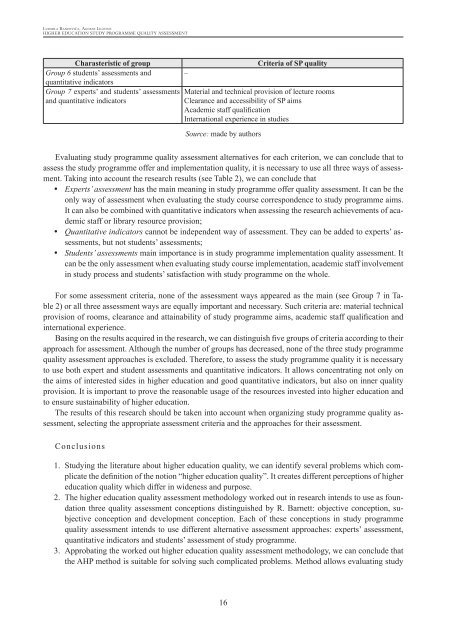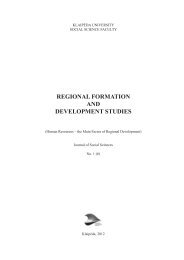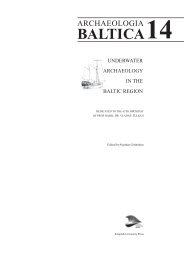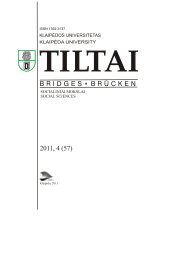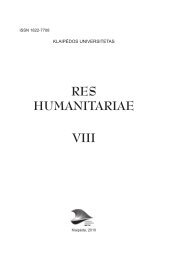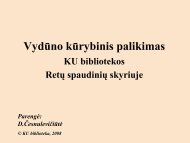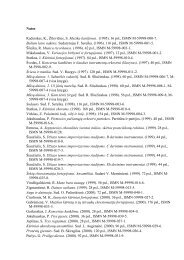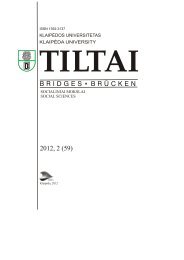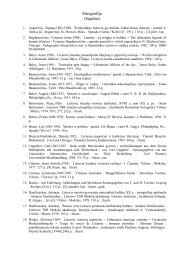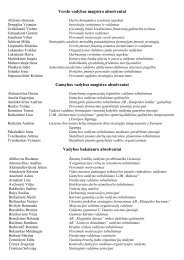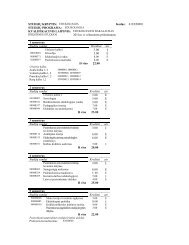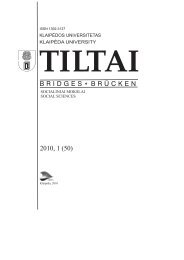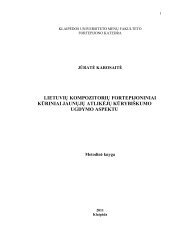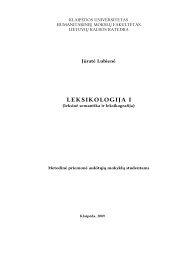regional formation and development studies - KlaipÄdos universitetas
regional formation and development studies - KlaipÄdos universitetas
regional formation and development studies - KlaipÄdos universitetas
You also want an ePaper? Increase the reach of your titles
YUMPU automatically turns print PDFs into web optimized ePapers that Google loves.
Ludmila B<strong>and</strong>eviča, Agnese Līgotne<br />
HIGHER EDUCATION STUDY PROGRAMME QUALITY ASSESSMENT<br />
Charasteristic of group<br />
Criteria of SP quality<br />
Group 6 students’ assessments <strong>and</strong> –<br />
quantitative indicators<br />
Group 7 experts’ <strong>and</strong> students’ assessments Material <strong>and</strong> technical provision of lecture rooms<br />
<strong>and</strong> quantitative indicators<br />
Clearance <strong>and</strong> accessibility of SP aims<br />
Academic staff qualification<br />
International experience in <strong>studies</strong><br />
Source: made by authors<br />
Evaluating study programme quality assessment alternatives for each criterion, we can conclude that to<br />
assess the study programme offer <strong>and</strong> implementation quality, it is necessary to use all three ways of assessment.<br />
Taking into account the research results (see Table 2), we can conclude that<br />
• y Experts’ assessment has the main meaning in study programme offer quality assessment. It can be the<br />
only way of assessment when evaluating the study course correspondence to study programme aims.<br />
It can also be combined with quantitative indicators when assessing the research achievements of academic<br />
staff or library resource provision;<br />
• y Quantitative indicators cannot be independent way of assessment. They can be added to experts’ assessments,<br />
but not students’ assessments;<br />
• y Students’ assessments main importance is in study programme implementation quality assessment. It<br />
can be the only assessment when evaluating study course implementation, academic staff involvement<br />
in study process <strong>and</strong> students’ satisfaction with study programme on the whole.<br />
For some assessment criteria, none of the assessment ways appeared as the main (see Group 7 in Table<br />
2) or all three assessment ways are equally important <strong>and</strong> necessary. Such criteria are: material technical<br />
provision of rooms, clearance <strong>and</strong> attainability of study programme aims, academic staff qualification <strong>and</strong><br />
international experience.<br />
Basing on the results acquired in the research, we can distinguish five groups of criteria according to their<br />
approach for assessment. Although the number of groups has decreased, none of the three study programme<br />
quality assessment approaches is excluded. Therefore, to assess the study programme quality it is necessary<br />
to use both expert <strong>and</strong> student assessments <strong>and</strong> quantitative indicators. It allows concentrating not only on<br />
the aims of interested sides in higher education <strong>and</strong> good quantitative indicators, but also on inner quality<br />
provision. It is important to prove the reasonable usage of the resources invested into higher education <strong>and</strong><br />
to ensure sustainability of higher education.<br />
The results of this research should be taken into account when organizing study programme quality assessment,<br />
selecting the appropriate assessment criteria <strong>and</strong> the approaches for their assessment.<br />
Conclusions<br />
1. Studying the literature about higher education quality, we can identify several problems which complicate<br />
the definition of the notion “higher education quality”. It creates different perceptions of higher<br />
education quality which differ in wideness <strong>and</strong> purpose.<br />
2. The higher education quality assessment methodology worked out in research intends to use as foundation<br />
three quality assessment conceptions distinguished by R. Barnett: objective conception, subjective<br />
conception <strong>and</strong> <strong>development</strong> conception. Each of these conceptions in study programme<br />
quality assessment intends to use different alternative assessment approaches: experts’ assessment,<br />
quantitative indicators <strong>and</strong> students’ assessment of study programme.<br />
3. Approbating the worked out higher education quality assessment methodology, we can conclude that<br />
the AHP method is suitable for solving such complicated problems. Method allows evaluating study<br />
16


